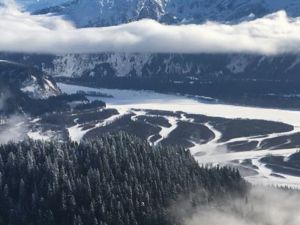Examining interwoven ecosystems, from mountains to oceans, in unique collaboration

When imagining Alaska and Pacific Islands, the snowy peaks and tropical beaches that spring to mind, respectively, seem to have little in common. But the two regions face some similar, important challenges.
Steep watersheds with dramatic environmental gradients are familiar features of both the Pacific Islands and Southeast Alaska, and both locations are experiencing significant alterations to watershed ecosystems and environmental processes due to climate change. On high Pacific Islands, the holistic watershed view is dubbed “ridge to reef” (R2R) while Alaska terms it “icefield to ocean” (I2O), but regardless of terminology, the lands are seeing impacts through terrestrial, freshwater, and nearshore marine ecosystems via the movement of water, energy, biota, and nutrients. Human communities in both regions depend on the cultural and ecosystem services provided by these watersheds.

Despite the profound importance of these R2R and I2O systems, sparse monitoring networks, difficult study environments, and inconsistent efforts to incorporate local, cultural perspectives and knowledge into the research process have resulted in severe limitations in understanding of how these watersheds function and respond to climate and other stressors. In turn, this lack of knowledge presents significant barriers to climate adaptation and management efforts.
PI-CASC and its sister institution, Alaska CASC, have joined forces to address these similar local challenges together, in a collaboration unique to the CASC network. Scientists from each region are teaming up to perform cross-regional research, cultural engagement, and synthesis, developing a variety of forums for scientists, managers, and students to jointly explore these systems and exchange knowledge as a means to support community-based climate adaptation.
Come listen to an NCASC webinar, titled “Ridge-to-Reef and Icefield-to-Ocean: Collaborative Research in Extreme Environment,” describing the origins and initial efforts in this PI-AK Collaboration on Tuesday, July 13 at 3:00 pm EDT, and presented by USGS Federal Directors of AK CASC and PI-CASC, Stephen Gray and Mari-Vaughn Johnson.
Learn more and sign up here for the webinar.
This webinar series is sponsored by the National CASC in partnership with the National Conservation Training Center (NCTC) and the Association of Fish and Wildlife Agencies (AFWA) to spotlight the Climate Adaptation Science Centers’ ready-to-use science.

